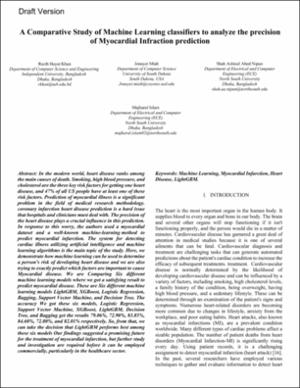A Comparative Study of Machine Learning classifiers to analyze the precision of Myocardial Infraction prediction

View/
Date
2023-10Author
Khan, Razib Hayat
Miah, Jonayet
Abed Nipun, Shah Ashisul
Islam, Majharul
Metadata
Show full item recordAbstract
In the modern world, heart disease ranks among the main causes of death. Smoking, high blood pressure, and cholesterol are the three key risk factors for getting one heart disease, and 47% of all US people have at least one of these risk factors. Prediction of myocardial illness is a significant problem in the field of medical research methodology. coronary infarction heart disease prediction is a hard issue that hospitals and clinicians must deal with. The precision of the heart disease plays a crucial influence in this prediction. In response to this worry, the authors used a myocardial dataset and a well-known machine-learning method to predict myocardial infarction. The system for detecting cardiac illness utilizing artificial intelligence and machine learning algorithms is the main topic of the study. Here, we demonstrate how machine learning can be used to determine a person's risk of developing heart disease and we are also trying to exactly predict which factors are important to cause Myocardial disease. We are Comparing Six different machine learning models where we got a satisfying result to predict myocardial disease. These are Six different machine learning models LightGBM, XGBoost, Logistic Regression, Bagging, Support Vector Machine, and Decision Tree. The accuracy We got these six models, Logistic Regression, Support Vector Machine, XGBoost, LightGBM, Decision Tree, and Bagging get the results 79.06%, 72.90%, 83.85%, 84.60%, 72.80%, and 82.01% respectively. So, from that, we can take the decision that LightGBM performs best among these six models Our findings suggested a promising future for the treatment of myocardial infarction, but further study and investigation are required before it can be employed commercially, particularly in the healthcare sector.
Collections
- 2023 [67]